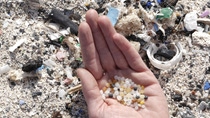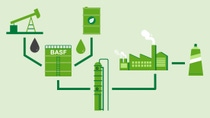Sustainability
BASF’s engagement for the responsible use of plastics
With its broad portfolio and strong capabilities in research and development, BASF offers high-value products and solutions for various applications and constantly works on increasing the sustainability of its products. For example, our plastic materials are used in health, automotive, construction and consumer industries contributing to a reduction in CO2 emissions through light-weighting (i.e., less fuel consumption) and insulation (i.e., less heating) or extended life of packed goods (i.e., less food waste). Examples include high-performance fossil, bio-based, biomass-balanced and certified compostable products helping to address diverse societal needs and sustainability goals.
Plastics is an important material class providing many benefits for our society and should be part of the future if we want to reduce our climate footprint. For many applications, plastics help to increase efficiency by saving resources in production and use phases. Over the life of a product, plastics used in buildings, vehicles, packaging or electrical appliances save far more resources than were needed to produce them in the first place.
Plastics are easy to process which is one of the secrets of their success. Even complicated integrated components can be manufactured in only a few steps. At the same time, they offer an enormous variety of unique properties in the different applications. At the end of their lifetime, there can and should be recycled – mechanically, chemically or organically. When the entire product lifecycle is considered, plastics are usually the best option – both economically and environmentally.
BASF is working on innovative technologies that promote the recycling of plastics. This includes also research and development on new materials and compositions that facilitate recycling processes as well as processes to create value out of plastic waste. Within BASF's ChemCyclingTM project, chemically recycled plastic waste is used as feedstock for production. By using plastic waste as a resource, BASF wants to make a significant contribution in reducing the amount of plastic waste. Chemical recycling provides an innovative way to reutilize plastic waste that is not currently recycled, such as mixed or uncleaned plastics. In this way, BASF wants to create value for the environment, society and the economy.
It is unacceptable that plastic waste is discarded in the environment and we are concerned about related environmental and social impacts. A well-functioning waste management infrastructure and consumer awareness are key to tackle litter. At BASF, we engage on several levels in company-specific as well as cross-industry initiatives to prevent and reduce the accumulation of plastic waste in the environment – be it research and innovation in new materials, business models and processes, housekeeping processes or the development of better waste infrastructure.
Examples:
- BASF is a co-founder of the Alliance to End Plastic Waste (AEPW), an organization that has been launched in 2019 with the mission to develop, accelerate and deploy solutions, engage communities and catalyze capital to end plastic waste in the environment. AEPW is currently made up of more than 50 companies that have committed more than $1 billion, with the goal of investing $1.5 billion over the next 5 years to help end plastic waste in the environment.
- BASF joined the World Plastics Council (WPC) in 2018, a global organization of leading companies in the plastics industry. The WPC promotes industry topics of global relevance, like the responsible use of plastics, efficient waste management and solutions to marine littering (for details see news release).
- BASF is member of the Ellen MacArthur Foundation, an organization to accelerate the transformation to a circular economy. BASF is taking part in the New Plastics Economy Initiative.
- BASF actively implements measures against plastic pellet loss at its pellet-handling sites globally and supports Operation Clean Sweep® (OCS), an international program that strives to prevent plastic pellet, flake and powder loss in the environment through the entire pellet-handling value chain.






